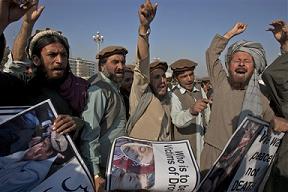| Home | Blog | Ask This | Showcase | Commentary | Comments | About Us | Contributors | Contact Us |

Civilian drone victims, unrecognized by the U.S. government and public, seek justiceSHOWCASE | May 131, 2012The White House says civilian deaths by CIA drones are 'exceedingly rare', but the survivors of one attack that killed 50 people in Pakistan describe the horror of a Hellfire hit in their petition to their government to launch criminal proceedings against those responsible. By John Hanrahan Two lawsuits filed in Pakistan on Wednesday lay out in tragic detail the CIA drone killings of some 50 people, including tribal elders, who were gathered in March 2011 for a tribal conclave, or Jirga, to resolve a mining dispute among two sub-tribes. The lawsuits, known as constitutional petitions, allege that -- contrary to U.S. assertions that civilians are only rarely killed in drone strikes -- the CIA in this and other instances “acts on faulty intelligence gathered from locals in return for money, who use this opportunity to settle tribal animosities, falsely labeling people as Taliban or militants.” Filed on May 9, the two petitions (here and here) were submitted on behalf of a total of nine individuals who are either wounded survivors or family members of victims of the drone strike. Of these nine victims, six were identified as tribal elders in North Waziristan. The petitioners are asking the Peshawar High Court to order the Pakistani government to raise the drones issue before the United Nations Security Council, the International Court of Justice and the U.N. Human Rights Council; to initiate criminal proceedings against those Pakistani or CIA officials involved in the drone attacks; and to set up an independent commission “to investigate the true extent of Pakistani civilian deaths in U.S. drone attacks.” Additionally, the petitioners are asking the court to order the Pakistani government “to immediately assert its State sovereignty and convey forcefully to the U.S. in clear terms that no further drone strikes will be tolerated on its sovereign territory.” Although the Pakistani government has told the United States that drone strikes must end in order to repair strained relations between the two countries, the U.S. has resumed drone strikes again in recent weeks after a one-month lull. Despite assurances from President Barack Obama and his top counterterrorism adviser John O. Brennan that civilian deaths in the CIA’s drone strikes in Pakistan are “exceedingly rare,” the two legal actions lay out a much more lethal version. The petitioners describe a story of local citizens coming together for the important community meeting on March 17, 2011 when, suddenly, a Hellfire missile from a U.S. drone struck the large gathering and killed some 50 people. The Jirga was in Datta Khel, in Northern Waziristan, which is in northwestern Pakistan adjacent to the border with Afghanistan. In addition to elders, other attendees at the Jirga were miners, Khasadars (Pakistan’s locally raised police force) and family members of these attendees. Five Khasadars were reported killed in the attack, as were young boys and many elderly people. Although the petition does not mention it, in Waziristan almost all adult males are armed, so large numbers of armed men coming together -- as was the case at the Jirga -- is hardly an indication that the men are hostile combatants who are legitimate targets for CIA drones. The petitioners, represented by prominent Pakistani lawyer Shahzad Akbar of the Foundation for Fundamental Rights (FFR), said that the Jirga was trying to resolve a dispute over acess to a local chromite deposit that “had been lingering on for a while and was threat to public peace and might had given rise to a long feud between tribes.” Chromite is a mineral that is a key ingredient in stainless steel. These are the first two cases to be filed by drone-strike victims against the government of Pakistan. Previous cases filed by FFR in district courts in Islamabad have sought criminal charges against the CIA for the drone-attack deaths. Drone victims have until now been almost invisible to the public, due to a near absence of press coverage from the ground. But the lawsuits and accompanying press releases issued by the U.K.-based human rights group Reprieve provide brief biographies of each victim named in the petitions, including that of Malik Daud Khan, head of the North Waziristan Loya Jirga council of local elders, who was chairing the Jirga when the Hellfire missile struck. His son Noor Khan, a postgraduate student working on an M.A. in political science, filed an individual suit against the Pakistani government over the death of his father. He said he was at home in Miranshah when he got word of the drone attack and immediately drove to the attack site. “I can only describe the scene of the strike as carnage,” he said in a press statement. “Fires were scattered about everywhere and the air was saturated with the scent of burnt human flesh.” He said his father’s body was badly disfigured. As a result of the attacks, according to Reprieve, villages across Waziristan lost community leaders and villagers are “living in constant fear of the drones ciircling above their villages. Children in the area are afraid to attend school because of drones, and Noor fears for the future of the community with children and young people failing to obtain an education.” Akbar, the attorney who filed the suits, had already earned the ire of the CIA and other U.S. government officials for, among other things, suing the CIA and publicly calling for the arrest of the CIA station chief in Pakistan and the CIA’s former acting chief counsel John A. Rizzo because of his reported role in the drone program. Reprieve’s founder and director Clive Stafford Smith and Akbar were in Washington, D.C. recently for a “drone summit conference” organized by the peace group Code Pink, the Center for Constitutional Rights and Reprieve. There, Smith argued that hundreds of noncombatants are killed by Reaper or Predator drone strikes in Pakistan because of faulty intelligence falsely identifying them as militants. The U.K.-based Bureau of Investigative Journalism has exhaustively documented the death of 479 to 821 civilians, including 174 children, in CIA drone strikes in Pakistan since 2004, out of a total of up to 3,113 people killed. Drone strikes have increased dramatically under Obama. President George W. Bush was responsible for 52; Obama for 270 and counting. “The same kind of intelligence used to put people in Guantanamo is the same kind of intelligence being used to launch drone strikes today,” said Smith, whose legal work to date has helped free 65 Guantanamo prisoners. He noted that the CIA, in efforts to identify armed militants and their wherabouts in Waziristan for potential drone strikes, is using bounty payments to gather some of this information -- just as it did in identifying the 779 Afghan and Pakistani suspected “terrorists” who were sent to Guantanamo. In many instances, these informants in Pakistan put GPS tags on vehicles of these supposed enemy combatants for tracking and possible eventual drone strike. This system thereby again creates the incentive for falsely naming people as being connected to the Taliban or other groups fighting U.S. and NATO troops, he said. Smith, who has spent much of his legal career in the United States on death penalty and civil rights cases, noted that an analysis of documents released last year by Wikileaks showed some 80 percent of persons imprisoned at Guantanamo turned out to have no connections to al Qaeda, the Taliban or other armed militant organizations. Many prisoners were falsely named as extremists by someone attempting to settle a score with them or to get bounty payments. One individual alone named as extremists 120 men who were then taken to Guantanamo.
|
||||||||||||




